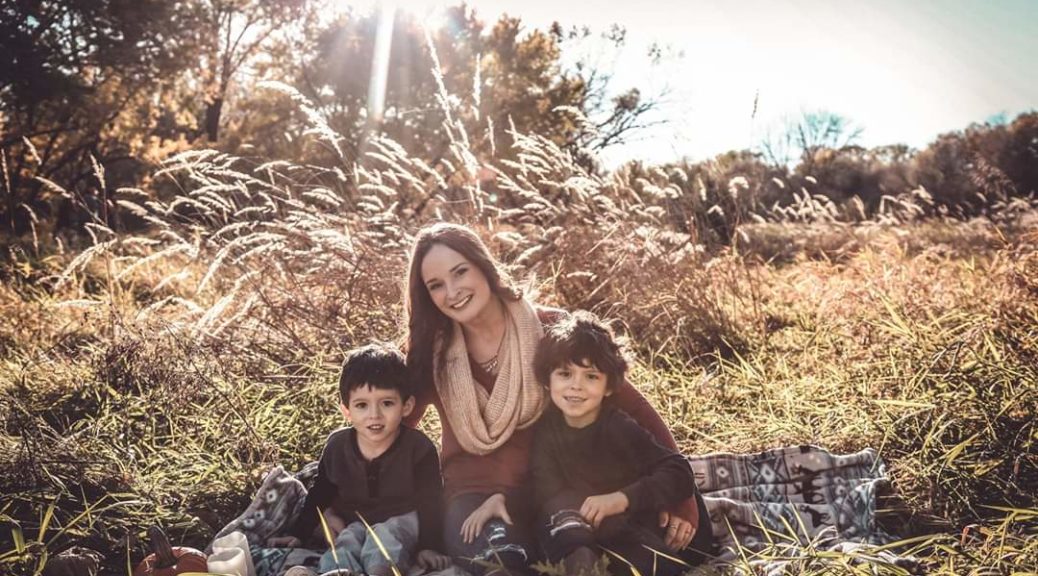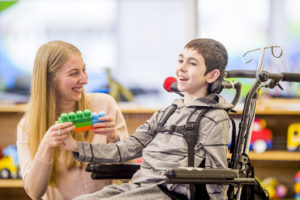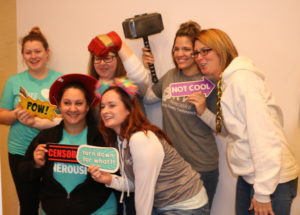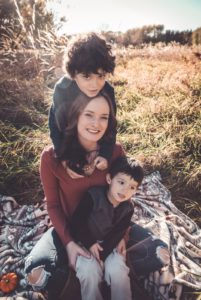Helping People with Disabilities Learn Skills for Independent Living

Ally Kirschenman (pictured above) joined KVC Nebraska in July 2017 as an Extended Family Home (EFH) Specialist. In this role, Ally supported EFH providers, which are the individuals and families helping people with disabilities by opening their homes to provide care, education and connection to community resources. She routinely visited the providers’ homes, helped families discover community resources and activities, attended team meetings, ensured clients learned independent skills, and advocated for clients to help them achieve success.
Provide a home where children, teens and adults with disabilities can learn social and independent living skills. Learn more about becoming an Extended Family Home today!
After 13 months in that role, Ally began transitioning to a new role as an Extended Family Home Program Support Specialist. In this role, Ally is helping grow KVC Nebraska’s services helping people with disabilities by recruiting new EFH providers and working with existing providers to ensure training requirements are met. A new challenge for her in this position was becoming a Mandt trainer, which is important training for our EFH providers. Mandt is a comprehensive, integrated approach to preventing, de-escalating, and if necessary, intervening in harmful behavior.
 KVC’s Extended Family Homes
KVC’s Extended Family Homes
Our EFHs provide individuals with intellectual and/or developmental disabilities (IDD) a structured, safe and loving home. EFH providers welcome the client into their own home and help them learn independent living and social skills. These clients have moved out of their biological family home for several reasons. For example, the client’s parents may feel they lack experience with disabilities, the client is an adult wanting the experience of living outside of their childhood home, and other scenarios. Whatever the case may be, EFHs provide round-the-clock support to help these individuals achieve their goals and live a more independent and community-driven lifestyle. Learn more about becoming an EFH provider and helping people with disabilities in our FAQ.
Read our Q&A with Ally below to learn more about her role and why she loves helping people with disabilities find loving homes where they can grow and learn new skills.
What do you find most rewarding about your job?
There are so many things about working in this field that are rewarding on a regular basis! Each day is different, but helping individuals find stability and happiness in a family environment is what makes me so proud of the work I do. Watching the provider families open their homes and make sacrifices to ensure the needs of their clients are met is truly inspiring.
“It has been very exciting for me to be part of this team and watch the number of people we serve continue to grow.” – Ally Kirschenman
 What is it like working at KVC?
What is it like working at KVC?
Working at KVC allows schedule flexibility, which is very important to me as a young mom. I also get to be around fun, friendly people who make me laugh and enjoy my time while at work. Our employees are always finding ways to show appreciation for each other, which makes for an open and caring work environment. I am continuously growing, learning new things, and being challenged, so I never find myself bored!
Do you have a memory of a proud working moment?
Anytime I can help de-escalate a situation and problem-solve with my team or a client’s EFH provider to prevent a disruption makes me proud of the team I work with! This job means being on-call 24/7 and supporting providers when they are experiencing difficult times. I can recall a time I visited a home early in the morning to transport a youth to school to provide extra support to our EFH family. Another time, I went to help a provider with a young, non-verbal child with autism who was difficult to redirect from entering a neighbor’s home. When the provider expressed their gratitude and thanked me for helping in even the simplest ways, it made me proud of the work I do.
What made you choose to work in this field?
I have always had a big heart, so working in this field and wanting to help people came naturally to me. I grew up with three younger siblings who I babysat often, as well as other young kids. I also worked in a nursing home in high school and college. I knew through these experiences that I wanted to continue to help people. I feel like my heart is in the right place when I do this work.
Do you have any advice for people considering becoming an Extended Family Home provider or the clients you work with?
My biggest piece of advice for EFH clients is to always be appreciative and kind. Being an EFH provider involves a significant investment of hard work, time and personal sacrifice! I try often to encourage the clients I work with to be kind to their providers and grateful for the work they do. Our providers care about each client’s well-being and want to see them succeed.
For anyone considering becoming an EFH provider, my advice is to gain personal experience specifically helping people with disabilities. Volunteer, provide respite care, and ask questions! Your heart has to be in it through the good times and bad, and having the experience to act quickly and rationally can help you through the harder times! Also just being open to feedback from various team members can be so helpful.  Every individual with intellectual and developmental disabilities is different, so you have to be open to trying new things and new approaches to serve our clients the best we can.
Every individual with intellectual and developmental disabilities is different, so you have to be open to trying new things and new approaches to serve our clients the best we can.
What do you enjoy doing when you aren’t working?
I have two sons ages three and six and a French bulldog that keep me busy every day! Our favorite activities to do together are going to the park, watching movies, playing Legos and taking road trips. We enjoy celebrating the holidays and finding any excuse to go to grandma’s house.
